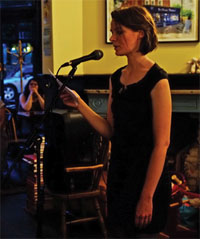
Afternoon
You place your hands in front of me
in answer to my question.
Summer warm, upturned
palms are mute.
I place a cool stone in one
pale grey, white striped and matte,
surface smooth against your lips
as I raise the stone to meet your mouth.
Your eyes flicker,
but remain quiet, watching
A passing car blares then fades music.
Not ours, not here, in silence
stood by the open window
of your Aunt’s spare room, we have only
the sound of sunlight on the carpeted floor.
when I sat down to write this poem, I had only one pre-requisite; that the poem should describe in some way the gloriously sensuous overload that is eating a piece of very ripe fruit. As you can see the fruit is nowhere to be seen in the final draft, or perhaps most recent draft – Stephen Fry, whose poetry I have not actually read, but whose book on poetry I own, says that a poem is ‘never finished, only abandoned’. However, that there is no longer mention of fruit is not a problem. In the writing and the shaping the fruit got chucked and the stone was picked. As the poem slowly emerges from the chrysalis of an initial idea, it changes colour, texture and taste; and in some cases of brutal editing, it grows wings and flies away entirely. And only an image, or an echo of an image remains from its conception.
Looking at the poem now actually, the stone is in fact a piece of fruit, only in another disguise, in another language. My poetry teacher is always reminding us to heed poet Elizabeth Bishop’s advice that a poem should be ‘like a mind thinking’ as opposed to a static thought. I like the image of the poem as an animal because poetry is both familiar and also, to a degree, unknowable.
“I like the image of the poem as an animal because poetry is both familiar and also, to a degree, unknowable
Half the poems I love, if not more, such as T.S Eliot’s ‘The Love Song of J. Alfred Prufrock’, have more channels of meaning than I will ever uncover; I could swim in that poem for years, and still never get to the bottom of it. And I think that one of the reasons that poetry is so powerful and at times so bewildering, is that it doesn’t immediately give itself to you in the same way that straighter prose or non-fiction does.
As an aside, I just want to confirm that I’m not making all these grand claims for this poem (hell no!), as I would not class it in the category of Poetry at all, trained as I am in the art of British self-deprecation. Maybe poetry, with a little ‘p’. But that’s another thing, what is poetry to one person is a pot of piss to another, and absolutely nothing can be done about that! Some people find Gertrude Stein’s ‘modernist’ writing – ‘rose is a rose is a rose is a rose’ – too pretentious, too impenetrable or just too bloody bonkers. Others have lauded her work as challenging a patriarchal system of language in which a rose can only ‘logically’ be ‘a rose’, and not ‘a rose, rose, rose’. I say Gertrude, you are right! a rose IS a ‘rose is a rose is a rose is a rose’!
Do you have a poem to publish or feedback on any of our poems published so far? If so just email us at poetry@therivermagazine.co.uk
-
TWO CLASSICS: The Shipwrights Arms and Simon the Tanner
Taking a look through the doors of our favourite local pubs
Category: Food&Drink -
2013 PROPERTY PRICES Great Expectations
Sales and lettings insights for the year ahead
Category: Property -
THE ART OF GIFTS at bermondsey 167
A concept born of two cultures
Category: Style -
NEVERMIND 'Jam On It', Here's Marmalade
Boutique Marmalade offers their style-savvy customers exactly what they want
Category: Style -
Dedicated Followers OF FASHION
An evening of Champagne and Absolutely Fabulous frocks
Category: Style -
A Surprise Dinner Party WITH GREGG WALLACE
A relaxed atmosphere at the Bermondsey Square Hotel with some great new dishes and a personal touch from Gregg and his team
Category: Food&Drink -
A NATIVITY SCENE Underneath the arches
We talk with Father Michael Cooley at Our Lady of La Salette and St Joseph Church about the history of local traditions
Category: For The Soul -
Art for the people BY THE PEOPLE
Bermondsey artist Austin Emery builds a community sculpture with the local residents of Tyers Estate, SE1
Category: Culture -
OLD FASHIONED Drinking
Tailored cocktails with modern twists
Category: Food&Drink -
A WINTER Hideaway
The sanctuary of the Quarter Bar and Lounge
Category: Food&Drink -
GET READY For a Party!
Introducing a Wicked Wardrobe range by Elly
Category: Style -
Shortwave BY LONG LANE
We meet up with Rob and Dean to view what’s new at the Shortwave cinema on Bermondsey Square
Category: Culture -
A POEM 'like a mind thinking'
The fruit of ideas
Category: For The Soul -
SHAD THAMES in the words of Charles Dickens
Walking through London streets and finding the lost souls that haunt the riverside
Category: Culture -
The Baltic JOURNEY
From 1780 until today, we take a look inside the changing space of 74 Blackfriars Road
Category: Food&Drink





















